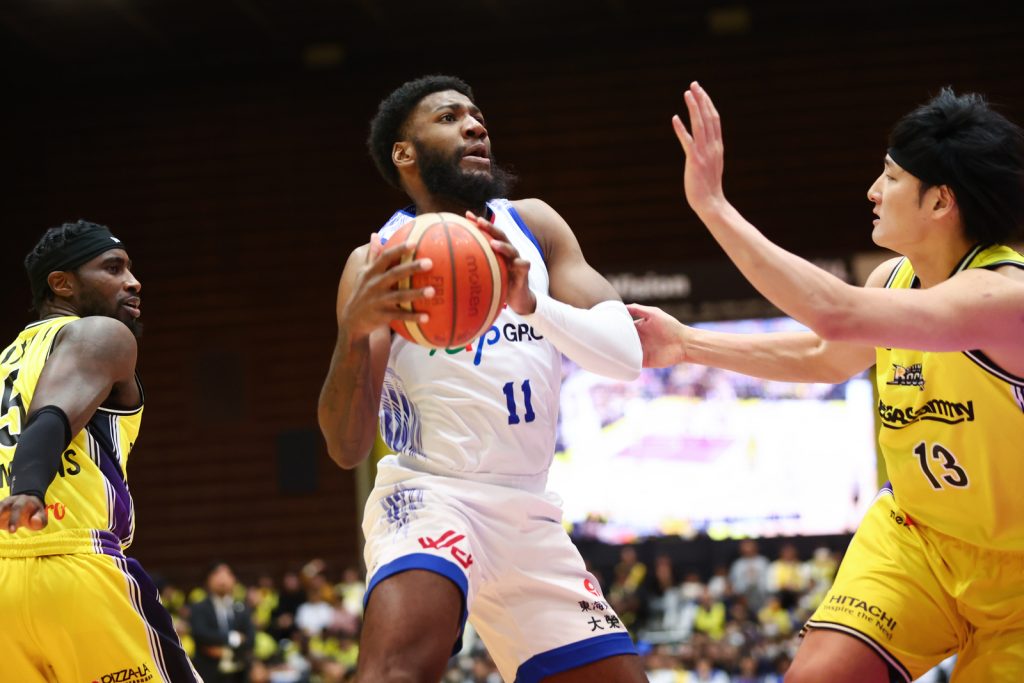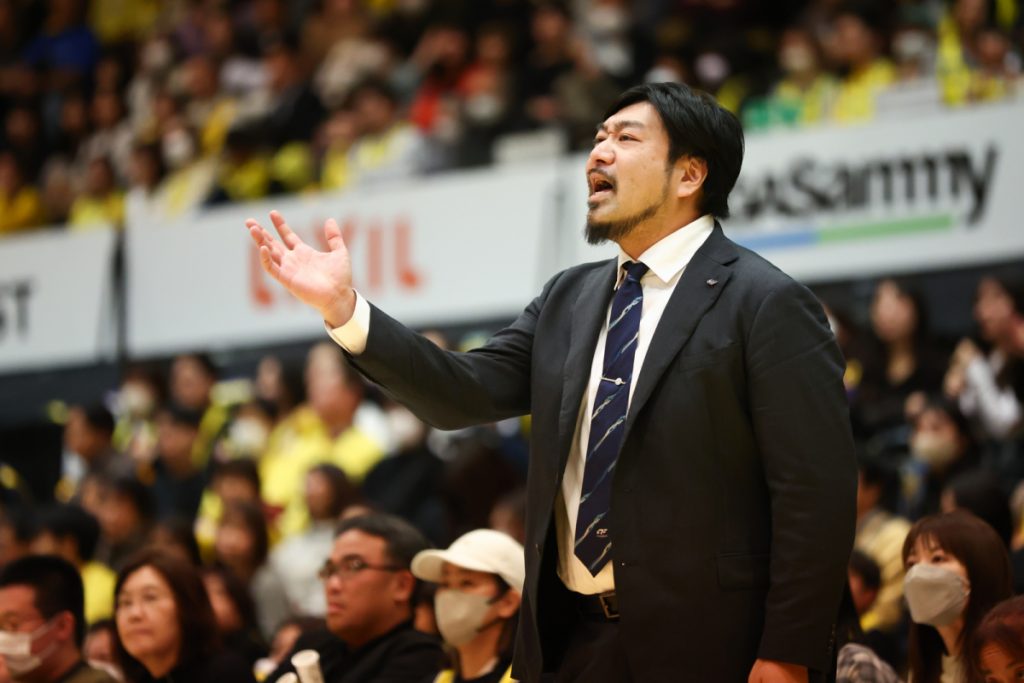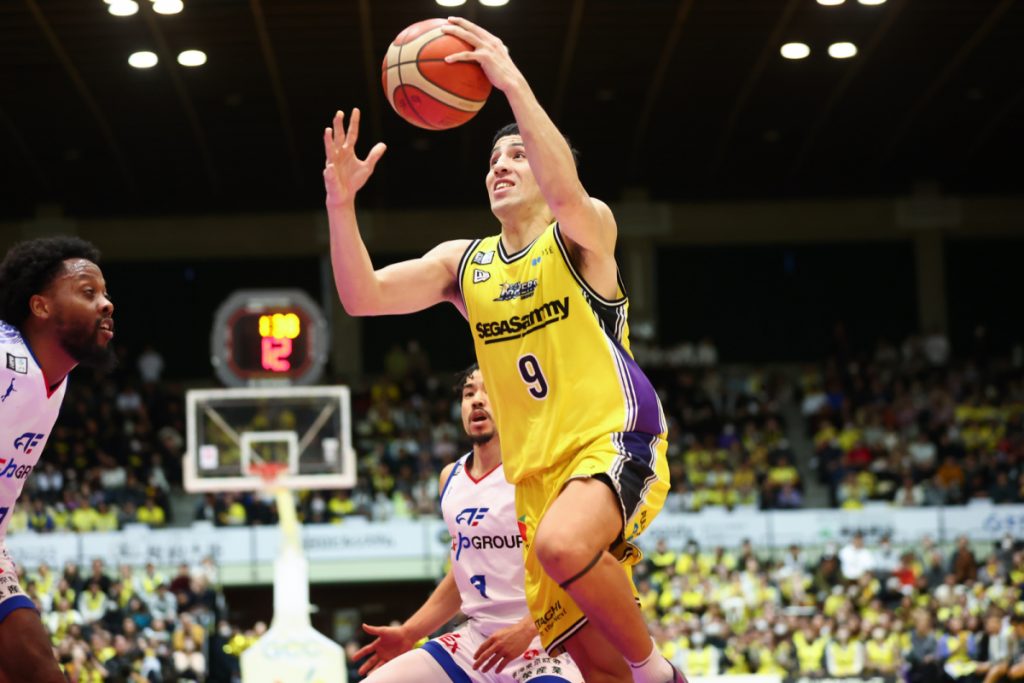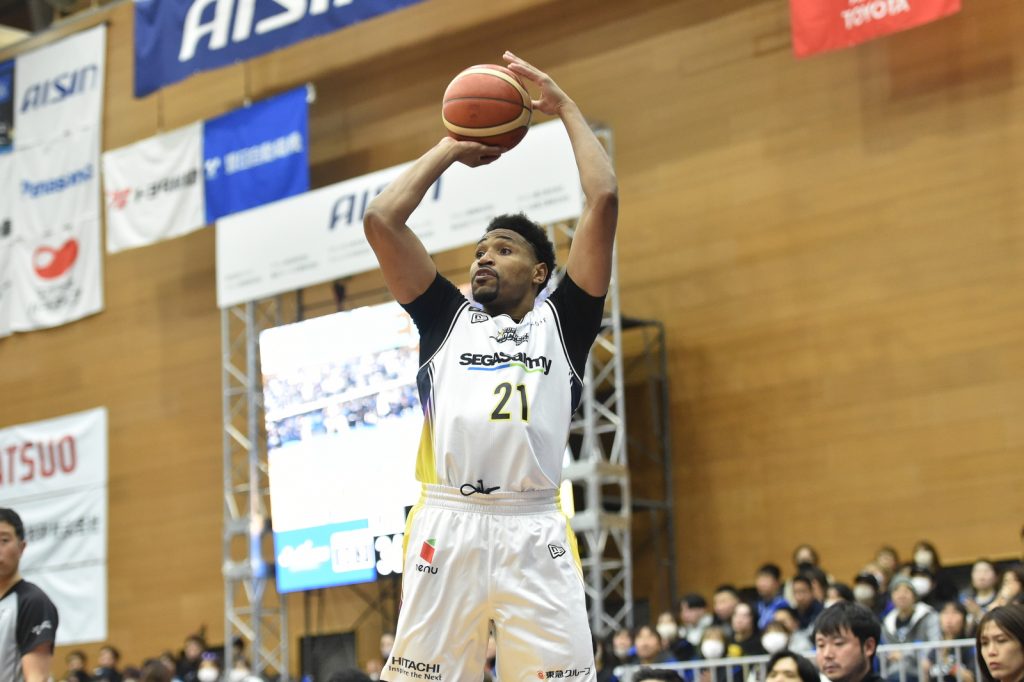
Sunrockers Shibuya head coach Luka Pavicevic talks to his players during a timeout in a B.League game against the Fighting Eagles Nagoya on December 15 at Aoyama Gakuin Memorial Hall in Tokyo. (©B.LEAGUE))
The B.League season is a 60-game grind featuring ups and downs for every team. And head coaches are like train conductors guiding their teams on this lengthy journey.
For each bench boss, an important part of the job is prioritizing how much time to spend reviewing a win or a loss with their team while also making adjustments and preparations for the next game.
In this context, is a detailed evaluation of the past game more important than a detailed scouting report for the next one?
Indeed, there's no one-size-fits-all strategy.
That said, it's interesting to learn how coaches approach these tasks as the season marches along. (More on that below.)
Through Wednesday, December 18, the B.League's 24 teams have played 22 games apiece, and nine clubs are in the 10-to-15-win range, including the Sunrockers Shibuya (14-8).
I attended the Sunrockers' 21st game of the season on Sunday, December 15 at Aoyama Gakuin Memorial Hall and watched the hosts take a 48-34 lead over the Fighting Eagles Nagoya with 5:37 to play in the third quarter. The Sunrockers appeared to be on course for their second victory in as many days over the Fighting Eagles. (Shibuya won the series opener 89-77, with Josh Hawkinson, who had 33 points, Anthony Clemmons and Leo Vendrame combining for 68 points.)
What followed, however, was a reminder that a big lead doesn't guarantee anything if enough time remains on the clock for the other team.

Every B.League Game Represents a New Storyline
Nagoya flipped on the metaphorical switch and began to overpower Shibuya, playing with more energy ― and, above all, playing with a sense of urgency for the final 15-plus minutes. Two statistical factors illuminated their electrifying comeback: The Fighting Eagles outscored the Sunrockers 50-30 in the paint and owned a 20-9 advantage in points from turnovers.
Battling physical fatigue and mental lapses, the Sunrockers, playing their eighth consecutive game without injured big man Reid Travis, squandered a 14-point lead.
They trailed 54-48 entering the fourth quarter after a stretch of play highlighted by a slew of missed shots and turnovers.
Attack-the-basket plays by the Fighting Eagles at the other end made a big difference as their offense started to click. Seven Nagoya players, led by American forward Aaron Henry's nine points, scored in the third quarter.

Nagoya outscored Shibuya 51-27 in the second half, including a 42-15 spurt to end the game, to earn a 76-63 victory.
Credit Fighting Eagles head coach Taizo Kawabe for incorporating what he later noted was a mix of new set plays into the team's offense in the weekend rematch. His players moved well without the ball and set strong picks to create good scoring chances. They made smart passes, too.

Moving Forward After a Loss in the B.League
About 15 minutes after his team's poor performance to wrap up Sunday's game, Sunrockers head coach Luka Pavicevic was asked how he would critique the game and also prepare his players for their next contest.
Would these be equal tasks time-wise?
"First, you don't have a lot of time to go back because they (the players) need to rest Monday," Pavicevic said, responding to my inquiry during the postgame news conference. "Then there is a short physical session one day before the [SeaHorses] Mikawa game, so we have one short session."
In that session on Tuesday, December 17, he said, discussions with the players would center on many things.
"What we do is have coaches working on scouting [an] opponent [and] coaches working on out-of-scouting [tasks], and then we choose short messages by word or by video," Pavicevic said. "We have a team meeting and we address it in the shortest way and the most important points."
After Sunday's loss, how did Pavicevic plan to organize what aspects of the team's performance would be reviewed in the meeting two days later?
Pavicevic said there were things that he considered priorities to discuss.
Such as?
Things that are "referring to this game that are important for our integrity," Pavicevic said.
He added, "We need to move on and it's a short time and coaches are working very hard to get a grip on what needs to be addressed, but it is being addressed ― what we did and what is facing us."
A New Week and New Opponents
Sunday's outcome wasn't the end of the world for the Sunrockers, who had 39 regular-season games remaining after Sunday's 13-point loss. Nor was it a king-of-the-mountain accomplishment for the Fighting Eagles.
Both teams had little time to dwell on how they performed in their 21st games of the 2024-25 campaign.
On Wednesday, December 18, both clubs were back in action.
The Sunrockers traveled to face the SeaHorses Mikawa, and the Fighting Eagles played host to the Yokohama B-Corsairs.
Shibuya bounced back with a 68-59 victory and Nagoya (8-14) dropped a 93-77 decision to Yokohama.
As a result, the Sunrockers sit four games behind the Central Conference's co-leaders, the San-en NeoPhoenix and the Alvark Tokyo (18-4). And the Fighting Eagles remain far behind in the quest for a playoff berth.

Author: Ed Odeven
Follow Ed's [Japan Sports Notebook] on Sundays, [Odds and Evens] during the week, and he can be found on X (formerly Twitter) @ed_odeven.






